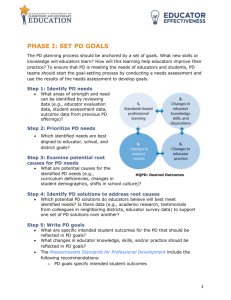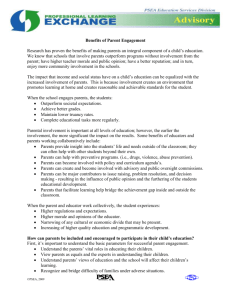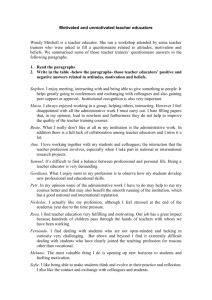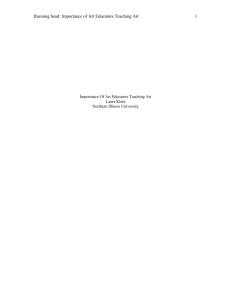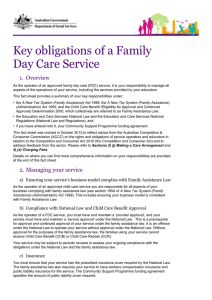Key obligations and expectations of Family Day Care educators
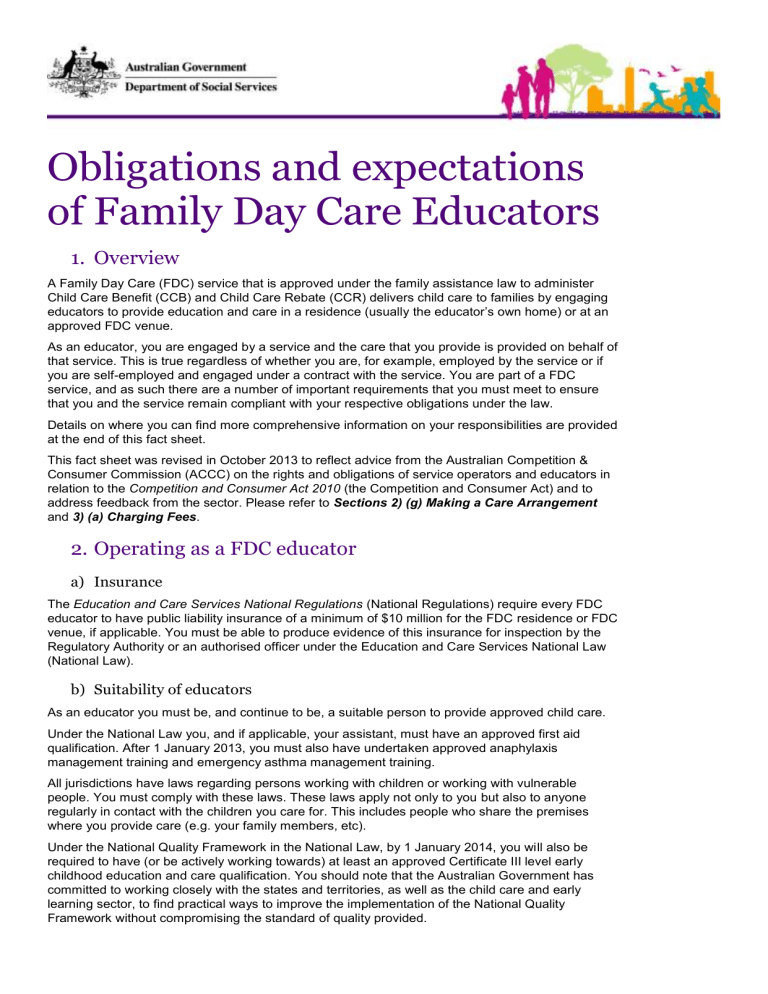
Obligations and expectations of Family Day Care Educators
1.
Overview
A Family Day Care (FDC) service that is approved under the family assistance law to administer
Child Care Benefit (CCB) and Child Care Rebate (CCR) delivers child care to families by engaging educators to provide education and care in a residence (usually the educator’s own home) or at an approved FDC venue.
As an educator, you are engaged by a service and the care that you provide is provided on behalf of that service. This is true regardless of whether you are, for example, employed by the service or if you are self-employed and engaged under a contract with the service. You are part of a FDC service, and as such there are a number of important requirements that you must meet to ensure that you and the service remain compliant with your respective obligations under the law.
Details on where you can find more comprehensive information on your responsibilities are provided at the end of this fact sheet.
This fact sheet was revised in October 2013 to reflect advice from the Australian Competition &
Consumer Commission (ACCC) on the rights and obligations of service operators and educators in relation to the Competition and Consumer Act 2010 (the Competition and Consumer Act) and to address feedback from the sector. Please refer to Sections 2) (g) Making a Care Arrangement and 3) (a) Charging Fees .
2.
Operating as a FDC educator
a) Insurance
The Education and Care Services National Regulations (National Regulations) require every FDC educator to have public liability insurance of a minimum of $10 million for the FDC residence or FDC venue, if applicable. You must be able to produce evidence of this insurance for inspection by the
Regulatory Authority or an authorised officer under the Education and Care Services National Law
(National Law).
b) Suitability of educators
As an educator you must be, and continue to be, a suitable person to provide approved child care.
Under the National Law you, and if applicable, your assistant, must have an approved first aid qualification. After 1 January 2013, you must also have undertaken approved anaphylaxis management training and emergency asthma management training.
All jurisdictions have laws regarding persons working with children or working with vulnerable people. You must comply with these laws. These laws apply not only to you but also to anyone regularly in contact with the children you care for. This includes people who share the premises where you provide care (e.g. your family members, etc).
Under the National Quality Framework in the National Law, by 1 January 2014, you will also be required to have (or be actively working towards) at least an approved Certificate III level early childhood education and care qualification. You should note that the Australian Government has committed to working closely with the states and territories, as well as the child care and early learning sector, to find practical ways to improve the implementation of the National Quality
Framework without compromising the standard of quality provided.
Obligations and expectations of Family Day Care Educators
This includes supporting a review of current child care and early learning qualification requirements in the National Quality Framework. The sector will be kept informed as these discussions progress.
c) Quality of care
As an educator, you must meet the minimum standards identified in the National Law and National
Regulations. These standards require that children have a safe, nurturing and developmental experience. They address, among other things, facilities, health and safety, programs and administration, and the suitability of the people providing the care.
You should be familiar with the Early Years Learning Framework and Framework for School Age
Care, as these are essential resources for implementing the National Quality Standards.
You must ensure your home or the approved venue where you are providing care meets the required standards for home-based care, including health and safety requirements for children. If providing FDC in an approved day care venue, you must ensure the venue meets the relevant standards.
Each state and territory may have additional or slightly different requirements. Further details about this can be accessed via the Australian Children’s Education and Care Quality Authority (ACECQA) website: www.acecqa.gov.au
d) Number of children in care
The National Law limits the number of children you may care for at any one time. Generally speaking, you may not provide approved care for more than seven children at a time. If your own children or other children in the premises are present during the periods you are providing care, these children count towards the limit of seven if they are under the age of 13 and there is no other adult caring for these children. You must also provide care to no more than four children at a time who are preschool age or under.
Part of the Australian Government’s commitment to work closely with the states and territories and the sector to find practical ways to improve the implementation of the National Quality Framework will include reviewing the implementation of staff to child ratios to assess whether their implementation should be slowed to give the sector enough time to absorb the changes and ensure continuity of service. Once again, the sector will be kept informed as these discussions progress.
When on an excursion you must meet the requirements in the National Law about the number of children for which you are allowed to care. You must also consider if you will need extra people to provide adequate supervision at all times. A risk assessment should be completed before an excursion. A template excursion risk management plan is available on the ACECQA website at: www.acecqa.gov.au
You must abide by the Priority of Access Guidelines when filling vacant places.
e) Keeping Records
Your service has an obligation to keep a range of records relating to the care provided within the service, under both the family assistance law and the National Law. This includes enrolment forms, evidence of insurance, and most importantly for you, the educator, sign-in sheets or attendance records.
Every day when parents drop their children off for care, you should have each parent sign the attendance record showing that the child attended.
The National Law and Regulations require that attendance records:
• record the full name of each child being educated and cared for and that date and time each child arrives and leaves, and
2
Obligations and expectations of Family Day Care Educators
• are signed by the person who delivers/collects the child at the time this occurs, or where the signature of this person cannot be reasonably attained, by you.
You must not ask families to sign attendance records for days their child would not normally have attended, for days before their child starts care or after they cease attending care.
You should be regularly providing copies of your attendance records to your service. You should also be providing copies of all records you keep to your service. This is because your service is required to provide copies of any records to the Department of Social Services, if they are asked.
f) Privacy
Information you collect or obtain through the delivery of education and care may be considered
‘protected information’ under the family assistance law and/or ‘personal information’ under the
Commonwealth’s Privacy Act 1988 . In handling such information, you are required to comply with these laws.
As an example, information you have about a child in your care, such as their name, date of birth or
Customer Reference Number, should not be disclosed to others except where required under the law. Please note that the family assistance law has penalties for unauthorised use or disclosure of protected information.
g) Making a care arrangement with a family
Family Assistance Law requires the service to make a care arrangement with each family using the service.
As an educator, you do not have any legal right to enter into a care arrangement for CCB approved care independently from the service. However, service operators may authorise educators (acting as an agent for their service) to enter into care arrangements on their behalf. In order to be eligible for
Australian Government fee assistance (e.g. CCB and CCR), the care arrangement and all associated invoices, receipts and statements must make clear that the care is being provided by the service and that the fees are being paid to the service.
3.
Money arrangements
a) Charging fees
Under Family Assistance Law, parents must be charged fees by the CCB approved service and not by the educator in order to be eligible for Australian Government fee assistance (e.g. CCB and
CCR). In order for CCB to be payable, there must be a direct commercial relationship between the family that is paying for the care, and the service that is providing the care.
Therefore, your service operator is responsible for setting a fee charging schedule and establishing fee charging policies.
Your service operator is legally entitled to require you, and all of the service’s educators, to comply with the service’s fee charging schedule and policies, irrespective of whether you are an employee or an independent contractor.
If you have a family receiving Jobs, Education and Training Child Care Fee Assistance (JETCCFA),
Special Child Care Benefit (SCCB) or Grandparent Child Care Benefit (GCCB), the service
(including you acting on behalf the service) must not charge a higher fee than the service would have charged this family if they were not eligible to receive one of these payments. It is an offence to charge a family a lower fee, for example if the service (or you acting on behalf the service) claims that a family simply couldn’t afford the service’s usual fee, and then to charge a higher fee once
SCCB, GCCB or JETCCFA is approved.
3
Obligations and expectations of Family Day Care Educators
b) Your remuneration
Your remuneration arrangements should be set out in a written agreement between you and the service operator, irrespective of whether you are an employee or a contractor.
Your remuneration arrangements are different to the fees families are charged by the service operator (or by you on behalf of the service).
It is important to understand that families to whom you provide care, on behalf of the service, make payments to the service and not to you personally. Many educators collect money from families; however, when doing so they are collecting on behalf of the service. How this money is handled (i.e. passed to the service operator and/or offset against remuneration the service owes the educator, etc.) is a matter to be negotiated and agreed between the service operator and each educator.
As outlined above, under the family assistance law it is the service, not the educators, that charge families for care. Also, after CCB is calculated if there is an outstanding gap fee for a family, legally the family owes that money to the service; not to you personally.
c) Statements and receipts
Your service is required, at a minimum, to provide families with a statement at least once every three months. This statement tells them what care has been provided, the fees that have been charged and the CCB that has been paid. All statements must be issued on behalf of the service and include the service name and related details.
As an educator, it is also good practice to provide receipts whenever you receive payments from families and provide a record of those receipts to your service. Under Australian Consumer Law a receipt must be provided if the payment is for more than $75.00. Please note that receipts provided by educators to families must make clear that the care is being provided by the service and that the fees are being paid to the service.
4.
Reporting attendance
Your service is responsible for submitting the attendance reports from all of its educators to the Child
Care Management System (CCMS). These reports determine how much CCB, CCR or JETCCFA is paid by the Australian Government for eligible families, so the accuracy of these reports is essential.
As an educator, you should be giving attendance reports to your service about the care you provide each week. You must make sure you report attendance correctly. This means only reporting attendance for sessions that the child actually attended . You can report absences, but only if the child would otherwise have been in care and only if the family was charged a fee for that care.
Your service is ultimately responsible, under the family assistance law, for the accuracy of the attendance reports it submits to the CCMS, and it is reasonable for them to contact you if your attendance records need clarification. Accordingly, if you, as an educator, submit attendance reports that are inaccurate, the service may decide not to submit the information to the CCMS until they are satisfied the report is correct. They do not have to submit exactly what you provide to them, indeed it is their responsibility to check and verify attendances before they are submitted for the payment of
Commonwealth funds.
Your service is responsible for the accuracy of the attendance reports, particularly in relation to the calculation of CCB and CCR. You should note however, if you provide false attendance records to your service and gained a financial advantage, this could be a crime and you could be subject to criminal prosecution for fraud.
5.
Providing care for the full session
If you are reporting a session of care, you must be able to provide care for that whole session. For example, you cannot report sessions of 8 hours per day, unless you are actually able to provide care for the full 8 hours. A child may not actually attend for the full 8 hours, but you must be able to provide care for the whole period of 8 hours, if the family requires it.
4
Obligations and expectations of Family Day Care Educators
If you cannot provide care for the full session, for example when you are not available for the full session, you must reduce the length of the sessions you claim to reflect the period in which care was able to be provided.
6.
Reporting suspicious or fraudulent behaviour
Fraud against the Commonwealth is an extremely serious matter and may constitute a criminal offence. Making false statements and/or providing misleading information has serious consequences such as criminal investigation.
If you find or have suspicions that a service or another educator is behaving fraudulently, you should contact the Child Care Support Line on 1800 664 231.
7.
More information
The main laws governing your FDC service’s obligations are set out below.
Commonwealth family assistance law:
• A New Tax System (Family Assistance) Act 1999
• A New Tax System (Family Assistance) (Administration) Act 1999
• Child Care Benefit (Eligibility for Approval and Continued Approval) Determination 2000 and other legislative instruments made under the two acts above.
All these are available on the Comlaw website at : www.comlaw.gov.au
The National Law (administered by your state or territory):
• Education and Care Services National Law Act
• Education and Care Services National Regulations
Further general information on your obligations can be found in the Child Care Service Handbook , located on the Department of Social Services website at: www.dss.gov.au
Other
For further information on the following items, visit the ACECQA website at: www.acecqa.gov.au
• National Quality Framework
• Quality Improvement Plans
• Early Years Learning Framework
• State and Territory licensing, including the details for your state or territory
DISCLAIMER
This fact sheet is a general guide to some of the legal obligations of FDC educators when providing education and care to children. This fact sheet is not a complete description of your legal obligations. This fact sheet also does not cover all the legal obligations of FDC educators. You should consult the relevant legislation for full details of your legal obligations. You may also wish to obtain your own independent legal advice.
5
